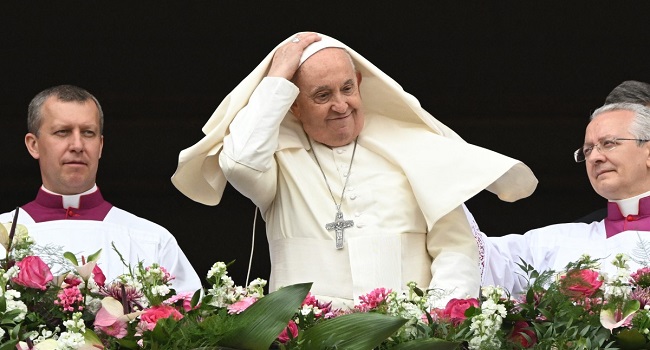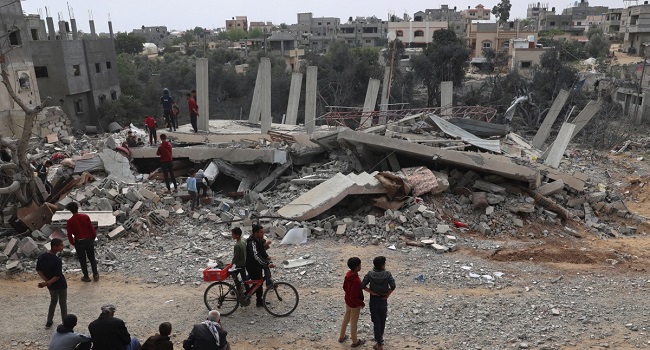
The International Criminal Court’s ruling that it has jurisdiction over the situation in the Palestinian territories opens the way to it investigating alleged war crimes committed in the 2014 Israeli-Palestinian conflict in Gaza.
The 50-day war, which devastated the coastal enclave and left 2,251 dead on the Palestinian side, mostly civilians, and 74 on the Israeli side, mostly soldiers, has already been the subject of a five-year preliminary ICC probe and a string of critical reports.
Here is a look at previous reports and probes into the war between the Jewish state and Hamas, the Islamist group that rules Gaza:
ICC preliminary probe
In January 2015, ICC chief prosecutor Fatou Bensouda launched a preliminary examination into whether there was sufficient evidence to warrant opening war crimes investigations into the conflict. The examination involved both Israeli and Palestinian actions.
That long-running probe looked at the 2014 war and later at violence near the Israel-Gaza border in 2018.
In December 2019, the prosecutor said she wanted to open a full investigation, having been “satisfied that war crimes have been or are being committed in the West Bank, including East Jerusalem, and the Gaza Strip”, without specifying the perpetrators of the alleged crimes.
Israeli Prime Minister Benjamin Netanyahu said that position made the Hague-based court, which Israel has refused to sign up to since its creation in 2002, a “political tool” against the Jewish state.
Bensouda said she would first ask the ICC to make a jurisdictional ruling on the matter, due to “unique and highly contested legal and factual issues attaching to this situation”.
On Friday, the ICC ruled it had jurisdiction over the situation in “territories occupied by Israel since 1967, namely Gaza and the West Bank”.
Netanyahu again slammed the court, calling the ruling “anti-Semitic”, while the Palestinians — who became a state party to the court in 2015 — hailed it as “victory for justice”.
UN reports
On June 23, 2015, a report by a UN Commission of Inquiry on the 2014 Gaza conflict says it received “credible allegations” that both Israeli and Palestinian militants committed war crimes during the war.
The report followed a UN Security Council document published on April 27, 2015, that blamed the Israeli military for seven strikes on UN schools in Gaza that were used as shelters. Forty-four people were killed.
The independent experts who compiled the report also found that UN schools, while vacant at the time, were in three cases used to hide Palestinian weapons. In two of the cases, militants probably fired on Israeli soldiers from the establishments, the report found.
Rights groups
International human rights groups, including Amnesty International and Human Rights Watch, also accused both sides of war crimes.
In late 2014, London-based Amnesty said it documented eight instances in which Israeli forces attacked homes in Gaza “without warning”, killing at least 104 civilians, and alleged that the destruction of four multi-storey buildings late in the war breached international humanitarian law.
It also said “Palestinian armed groups also committed war crimes” in indiscriminately firing thousands of rockets into Israel, actions which left six civilians dead.
In May 2015, it accused Hamas, which has ruled Gaza since 2007, of war crimes against fellow Palestinians to “settle scores” during the war, notably the execution of at least 23 people.
US-based Human Rights Watch said in September 2014 that in three cases it examined, Israel caused “numerous civilian casualties in violation of the laws of war”.
The incidents were the separate shellings of two UN schools in northern Gaza on July 24 and 30, and a guided missile strike on another UN school in the southern city of Rafah on August 3.
The attacks killed a total of 45 people including 17 children, HRW said.
Israeli reports and investigations
Israel in June 2015 defended its conduct in the Gaza war as both “lawful” and “legitimate” in a detailed inter-ministerial report.
The authors acknowledged that “numerous civilians were caught in the hostilities”, but they added Israel “did not intentionally target civilians or civilian objects”.
Israeli military authorities carried out their own investigations into the conduct of their troops during the war and in April 2015 announced three soldiers had been charged with looting.




